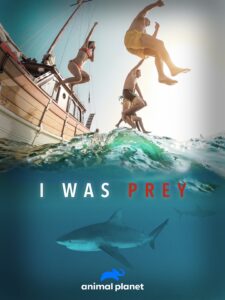 Please excuse my absence over the last 7-10 days while I was on deadline. I’m usually a better multitasker. *sigh*
Please excuse my absence over the last 7-10 days while I was on deadline. I’m usually a better multitasker. *sigh*
Every once in a while, a TV show comes along that’s a goldmine for writers. I Was Prey is that type of series.
If you’re unfamiliar with the show, each episode recounts the hauntingly true stories of people who found themselves in a life-or-death struggle with a dangerous animal. Whoever puts these shows together knows story structure, because each episode grips you, holds interest, and keeps you watching. It’s like a car crash. You cannot look away.
The benefit for writers comes through observation.
As each victim recounts their harrowing tale, watch their facial expressions, their involuntary tics and body movements. Listen to the inflection of their voice. It’s all real, raw emotion. These victims carry lifelong emotional and physical scars.
The grizzly bear and hippo attacks are my favorite. Not because I enjoy watching people fall prey to these animals, but because of their reaction to the animal’s power and strength. And we can use that to our advantage. The shock when they first encounter the animal, and what that looks like as they relive the moment on screen. More importantly, how they felt at the time.

Stories thrive on emotion.
It’s how we breathe life into characters.
By studying real people in dangerous situations, we can then transfer that emotion to our characters. It’s especially helpful for the young writer who has never experienced trauma, thus has an empty well of emotional upheaval to dip into.
Emotions add to the credibility of the story.
In a much-cited experiment, researchers showed several versions of the story of a father whose son is dying of cancer. The goal was to encourage listeners to donate money to charity. The versions of the story that emphasized statistics yielded the least donations. Versions focusing on the father’s feelings for his son’s condition gained the most.
Surprising? Not really. When we connect on an emotional level, we react.
Emotionally infused messages are more memorable.
Researchers have also shown how compelling stories boost hormones, oxytocin and cortisol. These hormones help us forge powerful connections. Stories that unlock strong emotions linger in a reader’s mind.
Evocative storytelling overcomes objections.
If we focus on “Just the facts, Jack,” the reader can experience analysis paralysis. Hence why there’s a fine art to weaving in research. Emotion allows readers to mark choices as good, bad, or indifferent, which in turn allows them to move beyond objections.
Emotional narratives inspire change.
For centuries we’ve told stories around the campfire. We’re wired to respond to traditional narrative structures. And so, emotion encourages empathy (say that five times fast). That emotional connection grounds the reader in the scene. Because they’ve been transported into the story, rather than merely reading words on a page, we’ve changed their mindset. Whether it’s temporary or permanent depends on the story.
A vivid, emotional story packs an extra punch and feels more real, more important. If you look back through times at moments when somebody’s beliefs changed, it’s often because of a story that hit home.
Emotion encourages word of mouth.
Emotion begets emotion. Readers who are moved by a story are more likely to recommend the book to friends, family, coworkers. They may even sing the author’s praises online.
Visceral emotion commands attention and creates a shared experience between character and reader.
Don’t tell the reader how the character feels. Show them through body cues, dialogue—external and internal—and unspoken truths. By doing so, the reader bonds with the characters.
Have you ever seen I Was Prey? Any suggestions for other documentary-style shows that writers can benefit from?

Thank you, Sue. I had never heard of this series. I will definitely check it out. Actually, I may contact the creators. Do you think they would be interested in my story about being trapped in an elevator with a spider? I could grow the story to fit the timeslot.
Hope you have a great week, Sue. Good luck with the new project!
Readers will love the spider encounter, but first you must give her a name. “Shelob” is already taken. I shall invert the concept and tell the story from the spider’s POV. Poor Octavia!
Octavia…. hahahaha
Ah, the night I found a spider in my bed, went to get something with which to dispose of it, and when I came back … it was gone.
Haha! I think we can all relate to a spider encounter, Joe.
Thanks! Hope you have a great week, too, SJ!!!
Nice post, Sue! I’ve not watched the show. Yet. Getting into your character’s head is often a good move, even when emotions are not maxxed out. It can enhance reader identification with the MC.
“Evocative storytelling overcomes objections.”
For sure. It hasn’t been very long since it was discovered that by triggering a person’s emotions, you could get them to disconnect their intellect. Objections are not so much overcome as circumvented, swamped in a sea of illogical passion.
And then there are book covers to consider . . .
Live long and prosper, Sue!
True, J. Well said.
Same to you, J!
Emotions are everything. While I’ve not watched that show (and don’t tell JSB, but I’ve never watched Godfather, either), writing in Deep POV means you have to get into the head, heart, and guts of your characters. For me, that’s a given, and why a more distant POV isn’t as effective at capturing me as a reader.
The Emotion Thesaurus by Ackerman and Puglish is helpful.
I agree, Terry. The Emotion Thesaurus rocks!
You’ve never seen the Godfather? It’s well worth the watch.
I heard that…
Haha. Busted!
But .. But … I put it in parentheses.
Hahaha *snort*
Wonderful post, Sue. Thanks! Emotion infusion is something I need to keep working on.
I have not seen I Was Prey, but I will look for it. I should take notes and put them in my Emotion Thesaurus. This topic also reminds me of Lisa Cron’s Wired for Story, chapter three, “I’ll feel what he’s feeling.” Chapter subheading: Story Secret: “All story is emotion based-if we’re not feeling, we’re not reading.”
Thanks for continuing to teach us neurophysiology and psychology. I hope your week is filled with good emotions!
Great Quote, Steve, and so true.
Thanks! Same to you, my friend. xo
When we finish the BBC’s Happy Valley, we’ll start this one. I love entertainment that teaches.
I remember Happy Valley, Mike. Good series. My all-time favorite BBC series is Wire in the Blood. Ever seen it? Superb.
I watched the entire series, Sue. Very well done, and for kinky gore, it’s the tops. It’s not for everybody, though, and I won’t be rewatching any episodes. What I remember most is how the MC loves his prey of a different sort.
I adored Tony Hill.
Lots of horrifying true-life shows on. I’m not a fan of the genre because I have too much empathy.
Showing, not telling, emotions is a hard lesson for some writers to learn. Some never do. They need to be the camera watching, not the person experiencing. Readers now want the feels of the experience, that’s the power that fiction has that movies and games can’t quite achieve. Brain science for the win!
Absolutely, Marilynn! If I’m not feeling the story, experiencing it, the author loses me. Life’s too short for dull reads. 🙂
Great post, Sue. I haven’t seen the series, but I’ll look into it. (As long as there aren’t any snakes, I’ll be okay with it.)
This reminds me of the movie The Edge with Anthony Hopkins and Alec Baldwin. When their small airplane goes down in the wilderness of Alaska, they find themselves being stalked by a grizzly bear. It’s an emotionally gripping movie. I think the bear should have won an Academy Award.
Haha. Me too, Kay! Loved that movie.
I’ll weigh in as the curmudgeon today. In a lot of recent fiction, emotion isn’t earned. It comes across as overwrought and verging on hysteria–OMG, there’s zit on my nose, my life is over.
That gets old for me real fast.
In mystery and thriller genres, I think a lot of readers also enjoy the intellectual challenge. They like to solve puzzles. They like to see ingenuity by the main character trapped in an inescapable dilemma. They like watching a complicated plot unravel.
Yes, emotion is critically important to capturing a reader’s interest but I think a careful, deliberate balance between emotion and intellect makes for the most memorable books.
Agreed, Debbie. If the emotion is overdone or melodramatic, it comes across as silly. If we put our characters into a dangerous situation without emotional context, the scene falls flat. Balance is key.
Terrific post, Sue. I have yet to see the show, but your write-up demonstrates the emotion gleaning potential in the episodes. It also gives a mini-workshop in what emotionally charged narratives accomplish.
One of my writing mentors used to say that there is only one rule of writing: affect the reader emotionally. Make them feeling something. The rest are all guidelines.
Another documentary that writers can learn from, which on the surface is about as far from I was Prey as you can get is Errol Morris’s Oscar-winning Fog of War. Compelling and emotionally revealing interviews with Robert McNamara, not just about Vietnam, but also WW2, the Cold War, and war in general, and the forthright way McNamara’s own emotions are shown in his body language, his expressions and words make it worth watching for writers.
Thanks for today’s post. Have a wonderful week!
Fog of War sounds terrific, Dale. Adding to my watchlist.
Thanks. Wishing the same for you!
I’ve never heard of this series, Sue, I gotta stay in more often. You know the story of me being the prey of the most dangerous animal alive – a deranged bushman, armed with a rife, on it’s own turf, and hell-bent on killing me. It didn’t go well for him.
That experience falls under a different category, Garry. 😉 There’s also I Survived a Serial Killer, but the emotions don’t stand out as much as in I Was Prey, believe it or not.